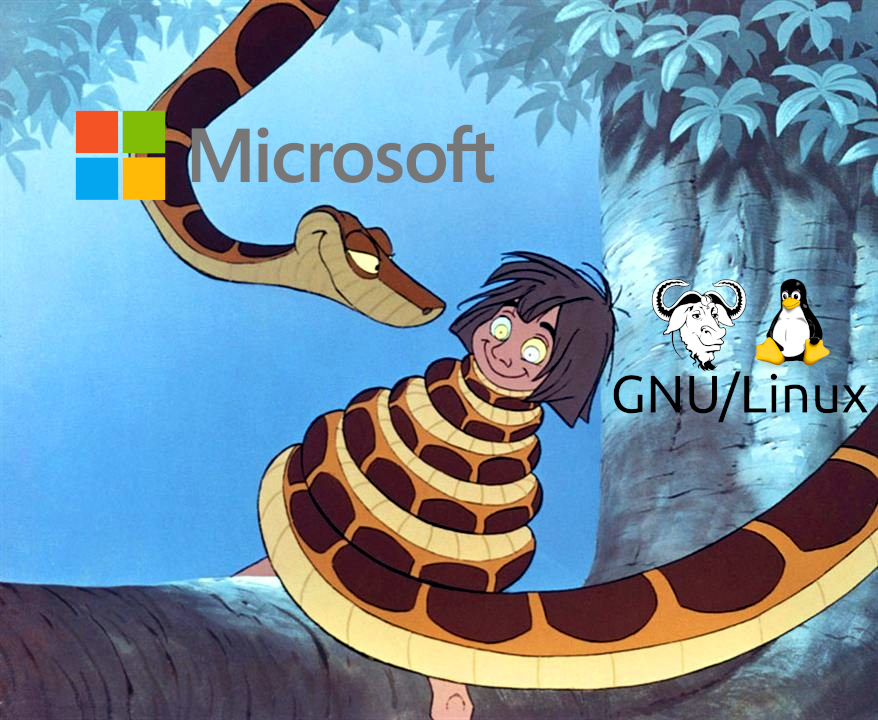

I hesitated a lot before writing this article. In fact, my heart was heavy. It would be like telling children that Santa Claus doesn't exist, or the tooth fairy is an invention and the Easter rabbit is a scam. How to do this, right now that Linux is becoming mainstream? Throwing a bucket of cold water in newcomers to Linux? Discourage new users?
However, I can't just think about who's coming now. I need to think about who has always been here, along the way. People who have lived great times, bad times, and, our times now, where everything looks good, but it is not. It is for those who have always been Linux users that I write this article. After all, we are like citizens, people who live in an area, in the city, which is old, ugly, even marginalized. Big contractors have marked our neighborhood for gentrification. And, they will go to great lengths to expel us from our homes, our /homes.
How did the cancer turn into love?
What has been happening, with Microsoft, since Steve Ballmer left the presidency, for those who observe it from the outside, seems incredible. How did Microsoft, a company that has always been an antagonist of Free Software in general, and GNU/Linux in particular, come to cooperate, finance and get involved with the community?

How was that? We cannot forget that Steve Ballmer called Linux and Open Source cancer in 2001. Incidentally, he, at the time, already dismissed the term Free Software in favor of the term Open Source, and even so, he confused the two terms and what it was possible to do with them. He said in 2001: "Government funding should be for work available to everyone," he says, patriotic. But "open source is not available to commercial companies" and therefore must be considered a violation of public trust." Said the guy who loved a government purchase, you know, where the money is let loose. And, that money comes out of the taxpayers' pockets. Let's be honest here: Government work, office work, can be done on Linux, or in a cloud, without the need for Microsoft systems, or its applications, and all the pendants that come along (anti this, anti that, etc, etc...).
But, this Ballmer mentality pushed Microsoft to a dead end: Everyone was using Free Software as a competitive advantage, but Microsoft, because of its CEO (Ballmer), remained an opponent of Free Software. Of course, Ballmer had his share of messes, like getting involved in cell phone manufacturing, which Bill Gates was opposed to, but Ballmer thought it best to acquire Nokia's plants and force his line of Windows Phone OS-based phones. That turned out to be an epic blunder, as we have all seen.
If you can't beat them, pretend you love them...
The situation with Ballmer had escalated, to the point that there was no other way out but his (Ballmer) departure from Microsoft. He retired from the company in 2014, and with his retirement bonuses and compensations, he was able to live very well. He even bought a basketball team, the Los Angeles Clippers. One thing, however, is that, despite being publicly considered "friends", there was quite a rivalry with Bill Gates. He never liked Ballmer's style, and with Ballmer at the helm, he saw the company shrink and become much less relevant than it was. Don't get me wrong. The company has shrunk, but it has remained profitable, breaking many records of profit and growth. It just became more of a technology company, and it was no longer the all-powerful Microsoft. Gates remained on Microsoft's board of directors until this year, 2020. And, we can speculate that Ballmer's departure had a finger from Gates, for the reasons mentioned.

A new face, but the same old intentions
As I mentioned above, Ballmer's style had burned all the bridges with Free Software (which they like to call Open Source), to the point that the company no longer had any credibility with the community. Enter Satya Nadella.

Satya Nadella's entry had an immediate impact on Microsoft. After decades of leadership by Bill Gates and Steve Ballmer, there was an aggressive, sometimes toxic, culture at Microsoft. Satya has dramatically changed Microsoft's culture, employee morale has improved and the corporate market was ready for the move to the cloud. Well, this new face, this change in culture, this whole turn around was what the company, Microsoft, wanted everyone to realize. In fact, Nadella's entry was a major publicity stunt. Not that he wasn't capable. He worked at Sun and started at Microsoft in 1992, talent he had and has. The change, however, was only cosmetic.
So much so that, when asked about equal wages for men and women at Microsoft, he went off on a tangent. That is, the more things seem to change, the more they remain the same.
If you can't beat them, buy a seat at the table.
Nadella started a movement towards Free Software, since all the other big players were already there.
Nadella, in charge of Microsoft, approached the company with companies and technologies with which Microsoft also competes, including Apple Inc., Salesforce, IBM, and Dropbox. In contrast to Microsoft's previous campaigns against the Linux operating system, Nadella proclaimed that "Microsoft ââ¢Â¥ Linux" and Microsoft joined the Linux Foundation as a Platinum member in 2016.
Yes, Microsoft bought a seat at the table, and forced its foot on the door. But it was not just that.
In doing so, Nadella lived up to the Mafia saying: "Keep your friends close, and your enemies even closer."
But, when building these "bridges", seeking this approach, Nadella set in motion plans with hidden motives, where the true nature of Microsoft appears, despite the friendly and smiling face.
Let's never forget James Plamondon
James Plamondon was an evangelist for Microsoft technologies. For eight years, he created and implemented Microsoft's technology evangelism tactics. There is a famous presentation of his "Evangelism is War", where he details the tactics that should be used to destroy Microsoft's enemies. Now, about technical journalists, he wrote: "Mind control: to control mental output, you need to control mental input. Take control of the channels through which developers receive information, so they can only think of the things you tell them. So, you control the mind!" The full text can be accessed here.
Since Microsoft has a good part of today's technical press on its payroll (ads and publicity), it is clear that it gets great articles, mainly about the bold plans to make the company, an Open Source company, of its CEO Nadella.
Years later, Plamondon regretted his actions.
Of course, in order for the community to believe in the "new" Microsoft, they had to invest in sites that dealt with Free and Open Source Software, such as Fossbytes and others. And, so much so, that today, there are sites on Linux that deal more with Microsoft advertising than with Linux itself.
Thanks to all the positive publicity, Microsoft has managed to change its image. But the icing on the cake was still missing, which was having all Free Software and Open Source projects for itself. And, incredible as it may seem, it materialized.
The purchase of github, or, how to have (almost) all Free Software in one stroke
GNU/Linux has always benefited from diversity. What some pointed out as a weakness, fragmentation, was actually, and still is, a quality and a strength of Free Software. So much so, Ballmer would have said that "There is no company called Linux, there is only a roadmap for Linux. However, Linux kind of springs organically from the earth. And it had, you know, the characteristics of communism that people love very, very much about it. That is, it is free."
Exactly, in such fragmentation, the organicity of Linux was its strength and shield. However, that would change a lot, with centralizations that would leave Linux vulnerable. With Nadella's leadership, Microsoft started with a wave of acquisitions, which proved to be better than Ballmer's clumsy acquisitions. He (Ballmer) bought Nokia, Skype and some other assets, which depreciated or lost relevance.

In 2014, Nadella's first acquisition by Microsoft was Mojang, a Swedish gaming company best known for the computer game Minecraft, for $2.5 billion. He followed this up by buying Xamarin for an undisclosed amount. He oversaw the purchase of the professional LinkedIn network in 2016 for $26.2 billion. On October 26, 2018, Microsoft acquired GitHub for $7.5 billion.
However, even the purchase of Github was a very well thought out move. In fact, an attack that could not have been done, but with great patience.
And, it took a long time to materialize.
In 2014, Microsoft's cloud chief Scott Guthrie wrote a proposal to acquire GitHub. Then he filed the plan in a drawer. From time to time, he would take the plan, look at it and then return it to the drawer.
Guthrie felt that Microsoft was simply not ready to acquire the popular open source company. "We would have screwed up," said Guthrie. In addition, the developers - many of whom viewed Microsoft as the #1 public enemy for its attacks on open source software distributed for free - would have revolted.
"The open source world would have seen us correctly as the antichrist," he said. "We did not have the credibility that we have now regarding open source." The whole story can be read here.
And this is correct. Has Microsoft changed? No way. They are still the antichrist. Only their tactics have changed. After all, a snake can change scales, but it remains a snake.
Microsoft, the empire created on the shoulders of others.
For those who do not know the company's history, it was founded on the work of others, which were not always legally acquired. The first product for IBM-PC computers, MS-DOS, was not even produced by them, but by Tim Patterson, of a Seattle company, which Microsoft hastily bought to present to IBM.
But it does not stop there. Over the years, the company has appropriated much more.
1994 - Stac, which created disk compression software, Stacker, and in 1993, Microsoft released MS-DOS 6.0, which included a disk compression program called DoubleSpace. Microsoft had previously discussed with Stac to license its compression technology and discussed with Stac engineers and analyzed the Stac code as part of the due diligence process. Result: They copied the technology, launched the product and gave nothing to Stac. Stac sued Microsoft and won in 2001.
1995 - Syn'x Relief sues Microsoft for software piracy: Several pioneering 3D animation features developed by the French company Syn'x Relief for its "Character" product, were copied by SoftImage. They were negotiating a license for several features with SoftImage, which was acquired by Microsoft. Negotiations were interrupted when SoftImage made irrational demands. These features are unambiguous and unique in the industry, and Microsoft had promised to remove them all from the SoftImage product. Microsoft did not remove any of them and Syn'x Relief found that they had no recourse but to sue. Syn'x Relief won in 2001.
1998 - Sun Microsystems sues Microsoft - the Java case - Microsoft, recognizing that Sun's Java environment could make Windows irrelevant, determined to corrupt and pervert it. To do this, they needed to license Java from Sun. Sun, wishing to promote Java as much as possible, felt that licensing it to Microsoft would be very advantageous for them, although James Gosling, its main creator, felt that dealing with Microsoft was too dangerous. Microsoft, in possession of the Sun license, modified Java in a way that programs made on other platforms would not work properly on Microsoft's Java and vice versa. Since Microsoft had signed a no-change clause in the software, Sun sued Microsoft, and in 2002 Microsoft had to settle, pay $ 20 million and no longer produce the Java virtual machine (JRE).
Well, all these lawsuits and problems were a thing of the past, weren't they? After all, now it's the new Microsoft, from Satya Nadella, a company that LOVES Linux and embraced the spirit of Free Software!
But no, they continue with the old practices, even today.
2020 - AppGet "really helped us", says Microsoft, but does not offer apologies to the developer for killing the open source package manager: A preview of WinGet (program to manage packages on Windows, Apt-Get clone) was launched by Microsoft during the recent Virtual Build event, prompting AppGet developer Keivan Beigi to post about how he was approached by Microsoft in July 2019, supposedly to offer him development aid. He said he was asked by the vendor in detail about his package management ideas, asked to apply for a job at Microsoft to work on an official version of AppGet and did not hear anything else until the moment before WinGet was released. After that, Beigi gave up working on AppGet. Link here.
2020 - I think it's time to share publicly about how Microsoft stole my code and spat on it: "Microsoft copies/steals lerna" - Lerna, A tool for managing JavaScript projects with multiple packages, was what "inspired" a similar tool, Rush, from Microsoft, who does the same thing. The author, Jamie Kyle, after analyzing the Rush code, came to this conclusion. But Microsoft did even worse, according to Jamie: "In the readme, they recognize the fact that there are other solutions and say they are bad. No mention of the fact that Rush was taken directly from one of those bad solutions."
The entire story was removed from the internet, being kept only in the org web archive and in articles spread across the internet. Who knows how Microsoft coerced the developer.
Embrace, Extent, Extinguish no more
No, actually, the 3E attack has changed. But, this was only possible with a new actor, a new face, the friendly Nadella, who, behind that smile and that sleepy face, continues to perpetuate all the harms of Microsoft, whether with its employees, with complaints of harassment and low wages for women, such as the practice of taking possession of someone else's work and giving no compensation for it.
Have there been changes at Microsoft? Advertising and public relations, yes, attitudes, no.
Otherwise, let's see:
So nothing has changed. Or, it changed for the worse: At least, under Ballmer's direction, Microsoft was not disguised: it wanted to destroy Linux and that was very clear. With Nadella, it still wants to destroy it, but in a veiled way.
However, how does Microsoft act now, in relation to Linux? With another EEE strategy, however it is now Envelope, Extend, Extinguish.
The new EEE
Since Microsoft couldn't compete with Linux, and the focus of the IT industry had changed (before, you had a company that manufactured software, to be sold, with licenses, support and maintenance. Now, you must have a company that sells services, infrastructure, virtualization and storage space), it then approached Free Software to be able to profit from it too.
But how would Microsoft profit from Free Software, which it has attacked so much over the years? Simple, make Linux need Microsoft to run. And, introduce Microsoft as the best Linux provider that can exist. How come? Yes, it's possible, and this is happening now.
Microsoft, one of the biggest contributors to the Linux kernel
Yes, it is true, Microsoft has become one of the biggest contributors to the development of the Linux kernel. What's more, it even put a programmer, employed by it, as second in the hierarchy of development of the Linux kernel. With all this support, Linux should already be super developed, compatible with all Microsoft hardware (Surface tablets), with DirectX, with OOXML files from MS Office, and even with Xbox games, right?
No, of course not. Microsoft's contributions are only in its own interest. In fact, all of this effort in developing the Linux kernel is just about making Linux performance better, running within Hyper-V. And now, it gets worse, because it is no longer emulating Linux on the server side, but also WSL, emulating Linux on the Windows 10 desktop. Yes, Microsoft is investing heavily to be able to emulate Linux in the best possible way, within their platforms: On the server, Azure, and on the desktop, WSL.
Make no mistake: Everything that is happening now, has happened before ...
Does history repeat itself? I would say that people repeat history, because they do not change. And, what we see today, with this approach of Microsoft, Linux and Free Software, is nothing more than the 90s repeating itself.
How? Well, who is younger does not remember this story, but it happened. Paul Maritz, head of the company's operating systems business, amid fierce competition with Netscape, would have outlined, in 1995, the strategy to defeat the competitor. He would have said: "We are going to cut off their air supply. Whatever they are selling, we will donate for free" After that, the next version of Windows, Windows 98, came with Internet Explorer built-in, free of charge, so that users didn't waste time buying and installing Netscape navigator, the Netscape browser.
The result of this was that Netscape was slowly languishing and dying, since with a built-in browser, Microsoft could create extensions for HTML, CSS and other things, which competitors could not keep up with. Besides, who would buy a browser, when there was already one built in with the operating system? The company shrunk to the point that it was bought by AOL in 2002. Its flagship product, the Netscape navigator, was open sourced and became the basis for Firefox. And, AOL sued Microsoft for unfair practices in the browser market in July 2002. In 2003, Microsoft agreed to settle with AOL, where it would pay US $750 million in compensation for its practices, ending the lawsuit. But at that point, almost ten years had passed, Netscape had almost gone bankrupt, and the Netscape Navigator was no longer even remembered. A victory, too late.
And today history repeats itself ...
And what is the relationship of this history with the current status of Linux? The same. Microsoft is working hard, investing heavily in the development of the Linux kernel to make it a client software for its Windows products, both on the desktop (WSL) and on the server (Azure). The logic is the same: Who will take the trouble to install Linux, when it is already built into Windows 10? Add to that the fact that new versions of the Linux kernel will come with specific drivers for WSL, mainly in the graphics (video drivers for OpenGL), and we are already in the second E (xtend), now for Envelope, Extend and Extinguish.
The sky is falling?
Not yet, but you should be aware. Next month, I will write more about how corporations are gradually taking over GNU/Linux, and, with its influence and power, changing the direction of its development, in order to alienate users and favor their corporate agendas. Until then, a big hug, and sleep with one eye open and one closed in this matter. ⬆